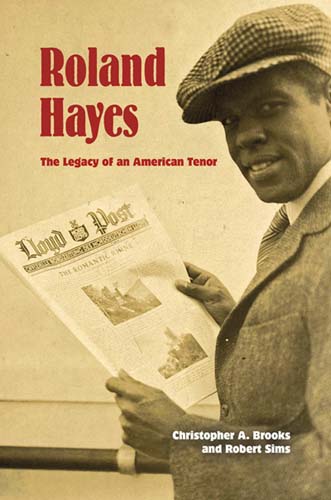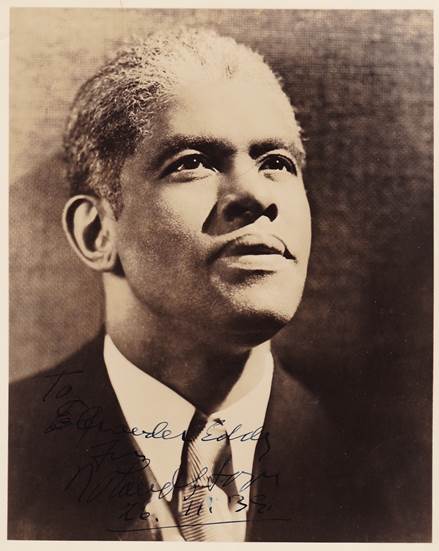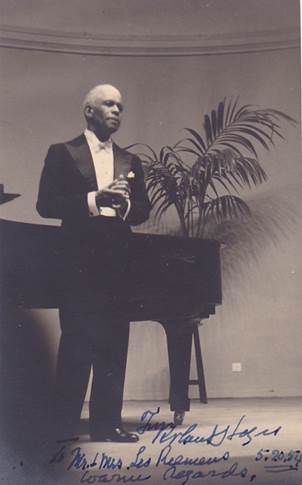
ROLAND HAYES, the Legacy of an American Tenor by Christopher brooks and Robert Sims

401 pp, Indiana University press, 2015
More than 50 years ago, one of the first books on singing and singers I ever bought was “Uren der zangkunst” (Hours of Vocal Art). The author was the well-known Dutch critic Leo Riemens. One of the chapters in the book was simply called : Roland Hayes. Other chapters were devoted to Enrico Caruso, Richard Tauber etc. So Hayes was one of the first singers well known to me though I had never heard one single record by him. In my very youthful illusions I thought he would probably combine the richness and the opulence of the Neapolitans’ voice with the charm of the Austrian. At first I was disillusioned when I heard the real sound many years later. Only Vickers whom Time had let me believe was on a par with Corelli and Del Monaco was as great a let-down when I first heard his big beefy sound without a true core. While I still think Vickers to be greatly overrated Hayes has very much climbed higher in my esteem.
Any biography of a singer is most welcome these days and I was quite curious what this new biography by Christopher A. Brook (known as the co-author of Shirley Verrets ‘I Never Walked Alone’) and Rober Simms would reveal. From the first page on I admit I was slightly put off by the unremitting political correctness shown by the authors. I’m sure they would crucify me for calling Hayes a black tenor though I feel I’m on safe ground. Recently James Meredith -who risked his life back in 1962 to enter Mississippi University- said in an interview how much he resents that politically correct ‘African-American’ that jumps five times from every page in this book. Mr. Meredith rightly claims himself to be an American. Full stop. Neither is there escaping the heavy sounding ‘African American spirituals’ on these pages.
Click here to watch a documentary on Roland Hayes
It’s a paradox that Hayes himself was definitely not outspoken on racial issues in the US. As a child of his time (born in 1887 of a mother who had been a slave in her early youth) Hayes specialized in behaving ‘dignified but humble’ as the authors write. Even by 1940’s standards they continue “Roland’s regressive position caused his legacy to suffer among African Americans, especially when compared to the reputations of Paul Robeson and Marian Anderson….at least perceived as having taken stands on important racial issues (whether rightly or wrongly). “ I think it somewhat easy to judge one’s attitude of 100 hundred years ago with today’s mentality and standards. Anderson too was definitely not outspoken and she didn’t inspire the outcry that went through the US when the manager of the DAR’s Hall refused to rent it for her concert. Robeson on the other hand did speak his mind but as a singer of simple ditties, movie and musical songs (which I all adore) he could easily be far more outspoken than Hayes. Everybody (well almost everybody) loved Robeson’s voice, his noble phrasing, his rich sound and he was immensely popular thanks to his many recordings of Show Boat and other Curly Headed Baby’s. Hayes by comparison had to mount almost Himalayan obstacles to succeed in becoming a singer of art songs by classical German, French, Italian and modern composers. This he could only do by strength of character, devotion and an awful amount of work. Can one blame Hayes for not being very outspoken on American community issues ? His public was most of the time preponderantly white and probably prejudiced. Bach, van Beethoven or Caccini were not favourite composers of the black community; nor were they even popular with ‘European Americans’ as the authors often write. So Hayes had to perform for a small elite who would think themselves very liberal and refined and polite though I suppose more than one of them thought that after the concert ‘the negro should know his place.” Still they came and paid their entrance tickets and Hayes’s fees. Rich he didn’t become as with the Depression Hayes had to cut his fees drastically. The authors even suggest (and they are probably correct) that the interest in Hayes flagged after many in the public had seen this black curiosity and afterwards could do well without him.
 (courtesy Charles Mintzer collection)
(courtesy Charles Mintzer collection)
There is one thing Robeson and Hayes had in common: a relation (or relations with Robeson) with white women. They both knew they had to hide them as white and black would damn them. I am glad to recognize the intellectual honesty of the authors (who are somewhat militant in their cause of defending ‘African etc.’) while they fully disclose Hayes behaviour. On concert tours in Europe the tenor had an eight year long affair with an Austrian countess who already had four sons with her husband. This must have been quite a sight as Hayes measured 5 feet 4 and the lady an unbelievable 6 feet one inch. Hayes fathered a daughter with the countess who believed that a racially mixed child was the start of a project that would lead to superior human beings. Hayes finally tired of her, behaved violently and cut off all ties to look after his first cousin whom he married. Their only legitimate daughter got quite a shock when she heard of a European half-sister’s existence and six to her unknown Hayes grandchildren after the tenor passed away in 1977. The tenor had successfully succeeded in hiding the traces of a European family for the American one, though it is possible his wife had an inkling of his European past. It is a tribute to Mrs. Afrika (her real name) Hayes that she delivered the whole of Hayes’s paper heritage to the authors, well knowing that they would draw an intimate portrait of her father with his many warts included.
Click here to see an interview with Africa Hayes
Still this is only one part of Hayes’ story. Maybe, due to the times Hayes lived in, the authors are somewhat less concerned with his musical choices and paths though they don’t neglect it.
The tenor sang operatic arias from time to time in concert but from the start of his career he refused to think of himself as an operatic tenor. Of course his chances in those days were slim in the US (only with a black company) and it was not sure Europe would welcome him. But the authors clearly state Hayes didn’t really have the heft to ride a full operatic orchestra for a whole evening. They tell us Hayes preferred singing piano or mezza voce a lot of the time so his voice sounded more voluminous the moment he let it out. Personally, I would have liked Brook and Simms to discuss more in detail Hayes voice and art. After all, I am sure far more vocal buffs will buy this book than black activists will do. In my opinion the Hayes voice is a strange but fascinating one. It is a little bit throaty and somewhat dry and I don’t think the tenor had an (operatic) high C in his vocal arsenal. But the timbre is personal and immediately recognizable. Hayes overcomes his vocal limitations by his outstanding phrasing, by caressing the vocal line, by his generous and wonderful pianissimi. His pronunciation too is an example. It’s not a voice for the masses but when one hears his recordings (even some of those few made in his declining years) there is magic in it. I can fully understand why Riemens who liked big guns as well was so generous in his praise for Hayes. After having heard the tenor one has to admit that a lot of fine singers who recorded negro spirituals with far more voice nevertheless sound bland and superficial compared to him. Are there other singers Hayes can be compared to ? Some will think of Schipa though the Italian didn’t have Hayes magnificent pianissimo and he surely never sang as idiosyncratically. The voice I’m most reminded of is that of another art singer (who nevertheless had an operatic career as well): Rumanian tenor Petre Munteanu.
 (unique photo dedicated to Leo Riemens, courtesy Charles Mintzer collection)
(unique photo dedicated to Leo Riemens, courtesy Charles Mintzer collection)
I do agree with the authors that Hayes is largely forgotten because of two wounds Hayes inflicted on himself. More than anybody else he knew his own voice, he knew what he could do and couldn’t do and wisely refrained from singing opera and damaging his subtle sound. However, no non-operatic tenor can earn the money and a lasting popularity by singing art songs alone and no art song singer ever had an international and highly profitable career in movies. Granted, Lanza and Schmidt almost never sang in opera theatres but they had real operatic voices and moreover they recorded profligately. And this is the second reason Hayes isn’t a household name anymore. During his best vocal years in the twenties and thirties he relied upon the concert going public; maybe even then not overly big but definitely far bigger than it is nowadays. He was proud of his accomplishments and difficult in his negotiations with record companies. He clearly didn’t grasp that records (even badly remunerated ones) by a singer who is not Caruso must be considered as an investment and not as a source of income. Hayes even refused to perform on radio which too would have meant his name and legacy could have been more important. This is somewhat strange as Hayes was a clever and canny manipulator. After an ugly incident whereby some police brutes beat him, he still had the moral force to turn his misery and humiliation into a publicity triumph that even revived a lagging career. In his last years he deeply regretted his lack of a recording career as his contemporaries were still well known (maybe one of the reasons he didn’t like Robeson) while he was forgotten.
All in all Messrs. Brook and Simms have succeeded in writing an interesting biography of this first great black tenor though there are two important omissions. Nowadays it is always de rigueur that a singer’s biography contains a chronology and a discography and they are both lacking. And I would surely have appreciated a CD accompanying the book so that everyone among us can judge for him- or herself. But stimulating and interesting the book is. I and a lot of people are definitely interested in biographies of other black singers; foremost among them Leontyne Price. But singers like Maynor, Arroyo and Bumbry are also worthy of this team’s interest. So I hope Brook and Simms will continue on this road.
Jan Neckers